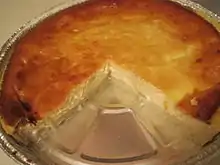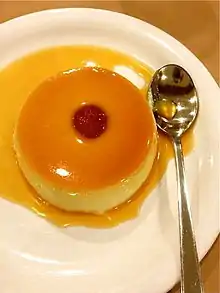flan
English
Etymology 1
Borrowed around 1846 from French flan (“cheesecake, custard tart, flan”), or in some uses (in reference to Spanish/Latin American flans) later from Spanish flan (itself from the French), both from Old French flaon (whence also Middle English flaon, flaun (“pie; cake”)), from Late Latin fladō (“flat cake”), from Frankish *flaþō (“flat cake”), from Proto-Indo-European *pleth₂- (“broad, flat”); compare German Fladen. Akin to Old High German flado (“flat cake, offering cake”). Doublet of flathe.
Although the -n is generally believed to derive from the Late Latin accusative form (fladonem) of fladō (“flat cake”), it might alternatively derive from an inflected form of the Frankish word (such as the Frankish accusative *flaþan, or the like). For a similar case, see garden.


Pronunciation
- (Received Pronunciation) IPA(key): /flæn/
Audio (Southern England) (file) - (General American) IPA(key): /flɑn/
- Rhymes: -æn, -ɑːn
Noun
flan (plural flans)
- (chiefly UK, Australia) Baked tart with sweet or savoury filling in an open-topped pastry case. (Compare quiche.)
- 2004, Shawn Blore, Alexandra de Vries, Frommer's Brazil, →ISBN, page 175:
- The menu includes a number of excellent fish dishes such as the […] broccoli flan.
- (chiefly US, Belize) A dessert of congealed custard, often topped with caramel, especially popular in Spanish-speaking countries.
- Synonym: crème caramel
- (numismatics) A coin die. (Compare planchet.)
Usage notes
- In the UK and Australia, flan usually refers to a baked tart (sense 1), and would only refer to a custard dessert (sense 2) rarely and in the context of the cuisine of Latin American or Mediterranean countries which use the word in that way. In the US, flan usually refers to the (Latin American-derived) custard dessert (sense 2), though uses of sense 1 can also be found.
Related terms
Translations
|
See also
Verb
flan (third-person singular simple present flans, present participle flanning, simple past and past participle flanned)
- (architecture) To splay or bevel internally, as a window-pane.
Derived terms
Etymology 3
English, from a slip of the tongue by actor Nathan Fillion.
Pronunciation
- IPA(key): /flæn/
- Rhymes: -æn
Noun
flan (plural flans)
- (informal, fandom slang) A fan of the U.S. TV series Firefly.
- Synonym: Browncoat
- 2005 January 29, P. Burrows, “Re: Name for Lost fans?”, in rec.arts.sf.tv (Usenet):
- (some) Firefly flans call themselves Browncoats (Remember, the hot movie from Universal is out this September! :)
- 2006 June 18, Geoff Aldrich, “Re: SciFi promotion [Was Firefly fans skew older?]”, in alt.tv.firefly (Usenet):
- For what it's worth, I'm 27 and am a huge Firefly/Serenity flan.
- 2007 January 21, Tal, “Re: Nude Jewel Staite? Close enough.”, in alt.tv.firefly (Usenet):
- I'm glad this wasn't the first flan group I came across or I would never have realised the great nature of the majority of browncoasts.[sic]
- For more quotations using this term, see Citations:flan.
References
- Nathan Fillion interview at an In Good Company premiere, 28 December 2004 (IESB.net video) (Wikiquote transcription)
French
Etymology
Inherited from Old French flaon, from Late Latin fladō (“flat cake”), from Frankish *flaþō (“flat cake”), from Proto-Indo-European *pl̥h₂t- (“broad, flat”), from Proto-Indo-European *pelh₂- (“to spread out, be broad, be flat”). Akin to Old High German flado (“flat cake, offering cake”) (German Fladen), Dutch vla (“baked custard”).
Pronunciation
- IPA(key): /flɑ̃/
- (Quebec) IPA(key): /flã/
Audio (file)
Further reading
- “flan”, in Trésor de la langue française informatisé [Digitized Treasury of the French Language], 2012.
Icelandic
Declension
Further reading
- “flan” in the Dictionary of Modern Icelandic (in Icelandic) and ISLEX (in the Nordic languages)
Indonesian
Etymology
From English flan, from French flan (“cheesecake, custard tart, flan”), or in some uses (in reference to Spanish/Latin American flans) later from Spanish flan (itself from the French), both from Old French flaon (whence also Middle English flaon, flaun (“pie; cake”)), from Late Latin fladonem, accusative of fladō (“flat cake”), from Frankish *flaþō (“flat cake”), from Proto-Indo-European *pl̥h₂t- (“broad, flat”), from Proto-Indo-European *pelh₂- (“to spread out, be broad, be flat”).
Pronunciation
- IPA(key): /ˈflan/
- Hyphenation: flan
Noun
flan (first-person possessive flanku, second-person possessive flanmu, third-person possessive flannya)
Further reading
- “flan” in Kamus Besar Bahasa Indonesia, Jakarta: Agency for Language Development and Cultivation – Ministry of Education, Culture, Research, and Technology of the Republic of Indonesia, 2016.
Middle English
Old English
Alternative forms
Etymology
From Proto-Germanic *flainaz (“hook, spear with a tip”), from Proto-Indo-European *pleyn- (“metal arrow, hook, spear-head”). Akin to Old Norse fleinn (“hook, barbed weapon, javelin, arrow”).
Pronunciation
- IPA(key): /flɑːn/
Declension
(when masculine)
(when feminine)
Romanian
Spanish
Etymology
Borrowed from French flan, from Old French flaon, from Late Latin fladō (“flat cake”), from Frankish *flaþō (“flat cake”), from Proto-Indo-European *pl̥h₂t- (“broad, flat”), from Proto-Indo-European *pelh₂- (“to spread out, be broad, be flat”).
Pronunciation
- IPA(key): /ˈflan/ [ˈflãn]
- Rhymes: -an
- Syllabification: flan
Derived terms
- (diminutive) flancito
Further reading
- “flan”, in Diccionario de la lengua española, Vigésima tercera edición, Real Academia Española, 2014